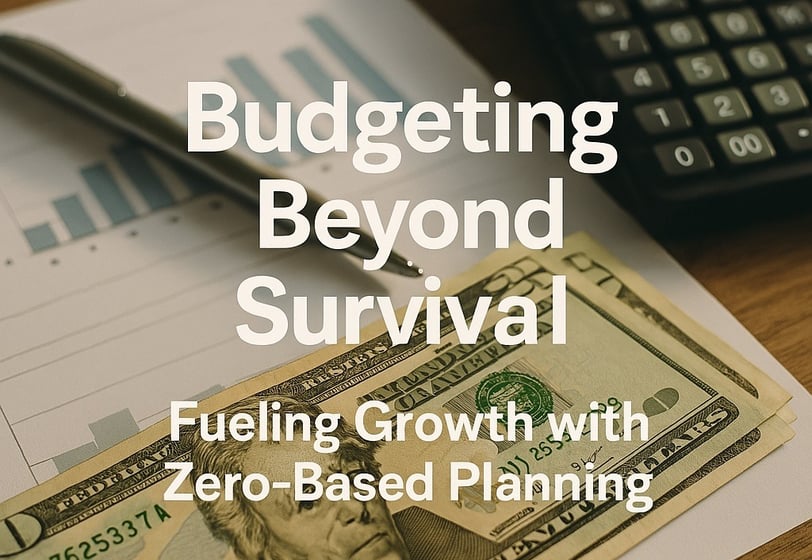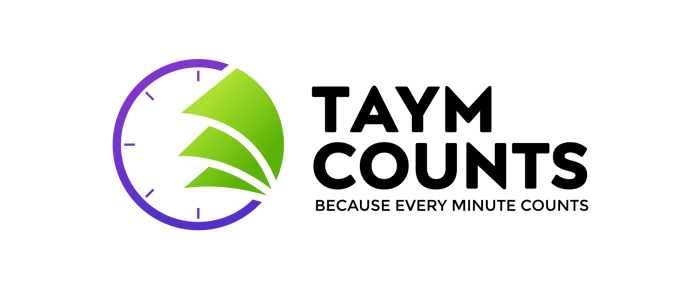Budgeting Beyond Survival: Fueling Growth with Zero-Based Planning
Move beyond reactive spending. This guide details how zero-based budgeting enables entrepreneurs to strategically balance costs and reinvestment, fueling intentional business growth and financial control.
FINANCIAL CLARITY & TIPS
4/13/20254 min read


Budgeting Beyond Survival: Fueling Growth with Zero-Based Planning
For many dedicated entrepreneurs, the financial rhythm of their business feels less like a strategy and more like a reaction. Money comes in, expenses are paid, and whatever remains is nebulously assigned to "growth" or simply absorbed by the next operational demand. This reactive cycle, while keeping the lights on, often leaves true, intentional expansion feeling perpetually out of reach. This article explores a more deliberate path: leveraging zero-based budgeting to balance current costs with strategic reinvestment, transforming your budget from a constraint into a powerful engine for growth.
The Reinvestment Riddle: Sarah’s Story
Consider Sarah, the founder of a thriving graphic design agency. Her team was talented, clients were happy, and revenue was steady. Yet, every month felt like a financial tightrope walk. She dreamed of investing in advanced software to boost efficiency and hiring a dedicated project manager to free her up for high-level client strategy. But the path from revenue to reinvestment was foggy. Money allocated for growth often got diverted to unexpected operational costs or simply vanished into the ambiguity of the general business account.
One Monday afternoon, reviewing her financials under a bright, sunny sky, Sarah felt a familiar anxiety creep in. The forecast predicted rain later in the week, a subtle reminder of the need to prepare for the future, both literally and financially. Her current budgeting method – essentially, subtracting expenses from revenue and hoping for the best – offered no real control, no clear map for navigating future opportunities or challenges. It was preventing her from making the bold moves needed to elevate her agency. The realization dawned: Reactive budgeting wasn't sustainable for growth; she needed a proactive, intentional system. This led her to explore zero-based budgeting (ZBB).
Zero-Based Budgeting (ZBB): Giving Every Dollar a Job for Growth
Unlike traditional budgeting which often adjusts based on previous periods, Zero-Based Budgeting starts each new period (typically monthly) from zero. Every single dollar of anticipated income must be allocated to a specific purpose – expenses, debt reduction, owner's draw, savings, AND crucially, strategic reinvestment – until the total income minus the total allocations equals zero.
This method forces a justification for every expenditure, shifting the mindset from "What did we spend last month?" to "What do we need to spend this month to achieve our goals?"
[Insert relevant image: A clean infographic comparing traditional vs. zero-based budget flow.]
Immediate Actions: Implementing ZBB for Your Business Growth
Adopting ZBB requires discipline but offers profound clarity. Here are actionable steps you can take immediately:
Forecast Your Income: Start with a realistic projection of your revenue for the upcoming period (e.g., month). Be conservative, especially when starting out.
List ALL Expenses: Itemize every anticipated expense, both fixed (rent, salaries, software subscriptions) and variable (supplies, marketing campaigns, travel). Scrutinize each one: Is it essential? Can it be reduced?
Prioritize Strategic Reinvestment: This is key for growth. Before allocating funds to non-essential categories, explicitly budget for growth initiatives. Examples include:
Marketing: Allocating funds for a new advertising channel or content creation.
Technology: Saving for specific software upgrades or equipment.
Talent: Budgeting for new hires, training, or outsourcing specific tasks.
Product/Service Development: Funding research or prototyping. Assign specific dollar amounts to these growth goals.
Allocate Every Dollar: Assign every dollar of your projected income to an expense, debt payment, savings goal, owner compensation, or reinvestment category. Ensure the equation balances: Income - (Expenses + Debt + Savings + Draw + Reinvestment) = 0.
Utilize Budgeting Tools: While spreadsheets work, dedicated budgeting software (like YNAB - You Need A Budget, though often personal, its principles apply, or business tools like QuickBooks/Xero budgeting features) can streamline tracking and allocation.
Review and Adjust Regularly: ZBB is not static. At the end of each period, review your actual spending against the budget. Analyze variances. Did you overspend? Underspend? Use these insights to refine your forecast and allocations for the next period. This regular review, like checking the weather forecast before the rain hits, allows for timely adjustments.
The Transformation: From Financial Fog to Focused Growth
Implementing ZBB, Sarah gained unprecedented control. She identified non-essential costs that could be cut, freeing up capital. More importantly, she began systematically funding her growth goals. Within six months, she invested in the new software, streamlining workflows. By year-end, she had budgeted enough to confidently hire the project manager. Her business wasn't just surviving; it was purposefully scaling, driven by a budget that reflected her ambitions.
This transformation isn't just about numbers; it's about peace of mind. It’s the confidence that comes from knowing exactly where your money is going and ensuring it aligns with your vision for the future – whether that's expanding your team, launching new services, or securing more time for family and personal pursuits.
However, effective budgeting hinges on one critical element: accurate, up-to-date financial data.
Clarity is the Bedrock of Budgeting
Zero-based budgeting, or any intentional financial planning, is only as powerful as the numbers underpinning it. If your bookkeeping is delayed, inaccurate, or disorganized, creating and sticking to a growth-focused budget becomes an exercise in frustration. This is where meticulous financial record-keeping becomes non-negotiable.
Taym Counts provides that essential foundation of clarity. With precise, timely bookkeeping, you have the reliable data needed to implement ZBB effectively, make informed decisions about reinvestment, and track your progress towards growth goals. We handle the financial details with professional rigor, giving you not just clean books, but the mental space and confidence to execute your strategic vision.
Ready to build a budget that actively fuels your business growth?
Secure Your Financial Future
Intentional budgeting is a cornerstone of sustainable business growth. By giving every dollar a purpose, especially those earmarked for reinvestment, you pave the way for achieving your most ambitious goals.
For a compelling perspective on structuring business finances for profitability, consider reading "Profit First" by Mike Michalowicz. While different from ZBB, its methodology of allocating profit before expenses offers valuable insights into ensuring your business consistently rewards you and funds its own growth. It complements the intentionality fostered by ZBB.
